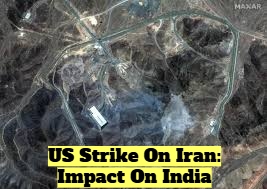

By Sunil Garodia
First publised on 2025-06-23 13:44:12
In a dramatic escalation of Middle East tensions, the United States launched airstrikes on Iran's key nuclear sites - Fordow, Natanz, and Isfahan - on June 22, 2025. Using stealth bombers and submarine-launched missiles, the operation aimed to cripple Iran's nuclear capabilities. In response, Iran has issued strong warnings of "all-out war" and hinted at closing the Strait of Hormuz, a move that could have global ramifications.
Oil prices surged past $78 a barrel following the attack, reflecting fears of supply disruption. The Strait of Hormuz, which handles nearly 20% of the world's oil shipments, is now in geopolitical crosshairs. For India, which imports about 80% of its oil, this spells immediate challenges.
The Indian rupee has already weakened, nearing Rs 87/USD, while markets brace for higher fuel prices and inflation. A $3-5 rise in oil could push up petrol and diesel prices by Rs 15-25 per litre, hitting households and industry alike. Additionally, Indian bond yields may rise due to market uncertainty. The Indian stock markets weakened today and the Sensex shed 511 points or 0.62%.
Geopolitically, India must tread carefully. It has long maintained friendly relations with both Iran and Israel. Prime Minister Modi has expressed concern and urged restraint from all sides, positioning India as a potential mediator in the crisis. He also spoke to Iranian President Masoud Pezeshkian to express his "deep concern". This could enhance India's global diplomatic stature - if it plays its cards wisely.
There are also national security concerns. A prolonged conflict could affect Indian shipping lanes and energy supply chains. New Delhi may accelerate its push for energy diversification, tapping into alternative suppliers and strategic reserves.
While the direct conflict is between Washington and Tehran, its tremors are being felt in New Delhi. The next few weeks will be crucial. For India, the challenge lies in balancing diplomacy, economic stability, and energy security - all while navigating one of the most volatile geopolitical flashpoints in recent years.











